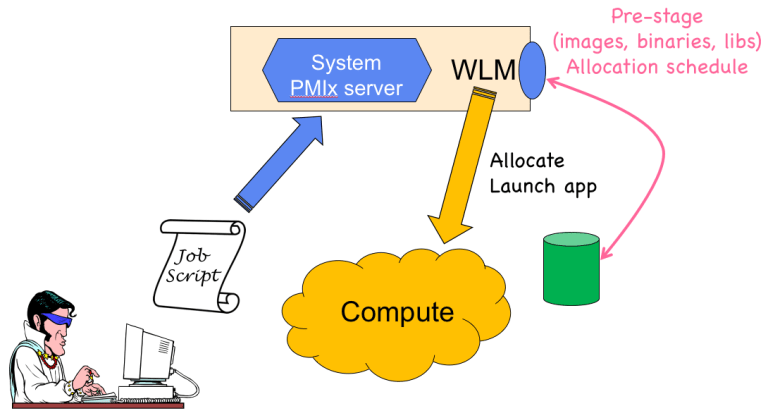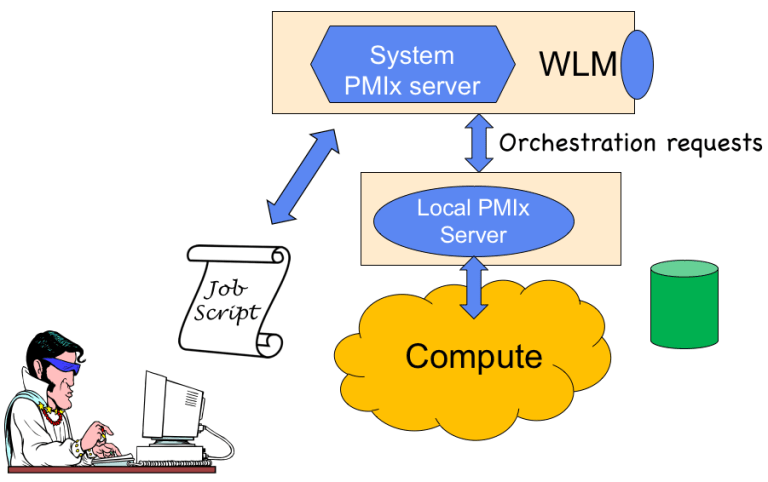OpenPMIx
Reference Implementation of the Process Management Interface Exascale (PMIx) standard
Downloads Privacy Policy Security Policy Publications Community ContributeUNDER CONSTRUCTION
Please note that tiered storage support is a subject of current RFC development. Thus, the description on this page should be considered a “draft” at this time and is provided to help stimulate discussion.
Next-generation systems are designed to access information that resides in an array of storage media, ranging from offline archives to streaming data flows. This tiered storage architecture presents a challenge to application developers and system managers striving to achieve high system efficiency and performance. Multiple vendor-specific solutions have been proposed, each with its own unique API and associated data structures. However, this results in a corresponding loss in application portability and increased cost of customer migration across procurements. Likewise, it would be burdensome for scheduler/work load manager (WLM) vendors to directly interface to storage managers from numerous vendors. Accordingly, the PMIx Storage working group seeks to define a flexible solution that allows vendor independence by defining an abstraction layer based on PMIx APIs and data structures in accordance with the PMIx standard architecture:
- requests from tools and/or applications will flow to their associated PMIx server, which will “upcall” them to their respective host SMS daemon – i.e., we retain the principle that applications and tools do not directly interact with SMS elements
- the host daemon may (if it chooses) directly implement support for the request by coding its own interface to the storage manager. Alternatively, the host daemon may call the corresponding PMIx API which will utilize an appropriate PMIx plugin to integrate with the active storage manager in that environment
- it is the responsibility of the host SMS and/or storage manager to determine and enforce user authorizations for the requested operation
The current effort focuses on two distinct stages: application startup time and run-time control for workflow steering. Underpinning the effort are several key premises:
- Cluster storage systems will increasingly utilize a tiered architecture composed of some combination of persistent storage and distributed cache
- Persistent storage will generally be constrained to parallel file systems, typically composed of rotating storage organized into a disk array and attached to the cluster through one or more IO servers
- Caches will be instantiated at a number of locations, including IO servers (currently denoted as “burst buffers”), network switches, compute cabinets, and compute nodes. Caches will typically be composed of non-volatile random-access memory (NVRAM), or some comparable moderate-speed media
- Storage bits flow in all directions – from persistent storage to caches to compute nodes, between caches, from compute nodes to cache, and from compute nodes to persistent storage (possibly transiting one or more caches)
- Data movement will occur in response to multiple stimuli, including faults, scheduler directives (e.g., pre-positioning data and/or binaries), and dynamic workflow directives from applications themselves
Application Startup
Application startup is significantly impacted by the time required to instantiate the executable and its dependent libraries on all of the active compute nodes. Understanding the time needed by the storage system to obtain access to the necessary bits on storage media and relocate them to the compute nodes is therefore essential to efficient use of the system’s resources.

The startup process can be separated into two phases. The first phase, shown at right, centers around identification of the bits required for execution of the application. Obviously, user specification of binaries and dependencies (both data and libraries) at time of job submittal offers the most accurate approach to this problem. However, users often cannot (or will not) provide a complete list of dependencies, especially when using third-party dynamically linked libraries.
In order to support these situations, PMIx provides an API by which the Work Load Manager (WLM) can obtain a list of libraries and files required by the submitted job using some combination of:
- PMIx standardized script-level directives from the user, with the PMIx library parsing the job script to harvest the directives;
- WLM defined script-level directives, which the WLM will parse and provide to PMIx as a list of identified dependencies; and
- automatic detection of links to dynamic libraries by binaries (e.g., via the standard Posix ldd tool and/or integration to a library such as XALT)
Once the dependencies have been identified, the WLM can query the storage manager to obtain an estimate of the time required to acquire executables, libraries, and data files specified by the scheduler, and position them to locations specified by the scheduler, using the results in its scheduling algorithm. This allows, for example, the time to retrieve data from cold storage (e.g., an offline tape archive) to be factored into the schedule.

The second phase of the startup process, shown at right, begins when the time window for job execution approaches – i.e., when the WLM anticipates the allocation will be given. At this point, the WLM alerts the storage manager to the upcoming allocation, passing the storage manager a list of files to be retrieved and locations where those files are to be cached. The precise timing of the caching operation is a function of the system management stack (SMS) environment. For example, some systems may initiate pre-staging while an existing job is executing its epilog, allowing the operation to continue in parallel with running the prolog for the new allocation. Others may choose to execute only during the prolog phase, or to make pre-staging contingent upon allocation of cache storage resources. The role of PMIx in this phase remains the same: to provide an API by which the WLM can direct the storage manager to move bits to their target destinations. A corresponding PMIx event has been defined by which the storage manager can alert the WLM when the bits have been cached into position.
Note that the WLM is not required to support these features – they are offered solely as an optional method for optimizing launch performance.
Run-Time Control
Run-time control over storage options – including the ability for applications to influence location, relocation, and storage strategies (e.g., striping across multiple locations, hot/warm/cold storage) of checkpoints and other data – is likewise of importance, particularly for dynamically-steered workflows. In this case, storage directives can be issued by both the application itself, and by tools executed by the user on (for example) a login node while the application is executing. Likewise, a mechanism is needed by which the SMS can alert the application to impending changes in resource availability, data movement, and other changes that might impact execution.

PMIx supports run-time storage control by providing:
- the PMIx_Alloc API to request allocation of storage resources. This includes attributes to specify the lifetime of the requested allocation (hard time limit, life of the current job or job step, etc.), minimum and desired allocation size, storage strategy for the allocation (e.g., whether the resources are to be considered hot/warm/cold, migration policies for stored data between levels), and prioritized set of desired locations and/or location attributes (e.g., persistence, replication strategy). Note that tools/applications that call the API to request resources will have those requests communicated to the WLM via the local PMIx server. At that point, the WLM decides on scheduling control – it could (for example) use the PMIx_Query_nb function to query the storage manager regarding availability and then schedule the resources itself, or it could use the PMIx_Alloc function to request that the storage manager schedule the resources
- attributes to be used with the PMIx_Query_nb API to obtain information on available storage, including directory mount points, capacity (both raw and available), and speed (both read and write)
- APIs and attributes for passing storage strategy directives to the SMS from tool and applications
- attributes allowing applications to query (via the existing PMIx_Query_nb API) supported storage directives, and the default (or currently set) location and storage strategy in place
- APIs and attributes by which tools/applications can direct the asynchronous movement of data across storage tiers
- PMIx events indicating when application-directed asynchronous storage operations have started/completed
A couple of key issues remain under discussion:
- requests for data movement across tiers/locations may complete after requesting process has terminated, thus necessitating definition of a mechanism to update completion state in a given location and/or notification
- when looking at scheduling, we may want/need to migrate data closer to where computation will occur. It isn’t entirely clear who (WLM, storage manager?) should make that decision, and it may be that an API/mechanism by which storage and scheduler can negotiate the question needs to be defined
Similar to the launch support, WLMs are not required to support run-time storage control – however, they are required to at least return a “not supported” error in response to requests for unsupported services. Providing a NULL function pointer in the server callback function structure is considered equivalent to providing the “not supported” response.